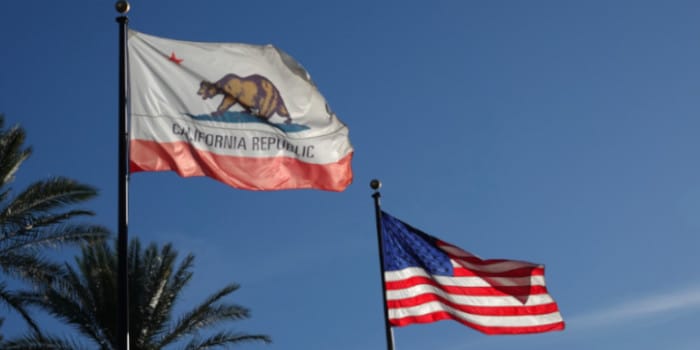- Casino
- By State
- Alabama
- Alaska
- Arizona
- Arkansas
- California
- Colorado
- Connecticut
- Delaware
- Georgia
- Florida
- Hawaii
- Idaho
- Illinois
- Indiana
- Iowa
- Kansas
- Kentucky
- Louisiana
- Maine
- Massachusetts
- Maryland
- Michigan
- Minnesota
- Mississippi
- Missouri
- Montana
- Nebraska
- Nevada
- New Hampshire
- New Jersey
- New Mexico
- New York
- North Carolina
- North Dakota
- Ohio
- Oklahoma
- Oregon
- Pennsylvania
- Rhode Island
- South Carolina
- South Dakota
- Tennessee
- Texas
- Utah
- Vermont
- Virginia
- Washington
- West Virginia
- Wisconsin
- Wyoming
- By State
- Slots
- Poker
- Sports
- Esports
Worker Rights Introduced in New Californian Tribal Compact

With a new 25-year tribal compact signed between California and the Tolowa Dee-ni’ Nation, the tribe will have to observe specific off-reservation impact policies and workers rights.
California Signs New Compact with Tolowa Dee-ni’ Nation
California will try to influence workers rights policies within tribal casinos a new compact signed by Gov. Gavin Newsom and the Tolowa Dee-ni’ Nation suggests. The agreement outlines specific provisions for workers rights and what steps the tribe must follow to comply with state-mandated employee protections laws.
The Tolowa Nation will have to comply with certain prerequisites of the compact approved on August 4, including consultations with Del Norte County, and make sure expectations are upheld.
The tribe is currently in charge of the Lucky 7 Casino located in Smith River. With the compact signed by the governor, Troy Ralstin, Tolowa executive director, sent a letter to the Del Norte County Board of Supervisors on August 6, asking for help with the ratification of SB-869 in the state senate.
Ralstin explained that SB-869 had introduced not significant, but important changes to the current 1999 compact and now sought the approval of lawmakers. He noted that the current version of the compact did modernize terms related to enhanced employee protections, as well as addressing certain environmental concerns and off-reservation impacts. This comes on time as California is urging residents to use energy sparingly.
With the passage of SB-869, the Tolowa Nation can finally have a working new contract for the Lucky 7 property. While the current compact signage is a small victory for the state, California has been facing some legal pressure from tribes on the matter of gambling.
The Compact Is a Win for the Tribe
The new compact introduces changes that benefit the tribe in several ways. For starters, the original compact was signed between the Smith River Rancheria and the state, whether the tribe changed its name back in 2015 and the compact reflects that.
The government agreed to extend the new compact by additional five years, for up to 25 years compared to the original 20 years. While each tribe in California has to negotiate an individual compact, the new compact is an attempt to standardize the way the Golden State handles tribal gaming affairs. Here is what the government’s office added:
“Each of the individually-negotiated new compacts reflects the governor’s and the Tribes’ mutual commitment to a strong and respectful government-to-government relationship, and to promoting tribal economic development and self-sufficiency and strong tribal government.”
While the compacts give tribes some exclusivity over gaming in the state, California is also getting something out of it. The compacts are a guarantor that non-gaming organizations and specifically public services are funded as part of a revenue-sharing scheme negotiated by the state with the tribes.
All sharing happens through the Revenue Sharing Trust Fund and the Tribal Nation Grant Fund. Many states use these public funds to pay retirement for state employees and to try and tackle soaring deficit.
The Tolowa Dee-ni’ Nation had also acted quickly, opening negotiations in 2017 as the tribal compact negotiated in 1999 is expiring this year. Meanwhile, compact Supervisor Chris Howard argued that the changes pertaining to workers rights were an important, progressive stance added to the legal language of the compact.
County Administrative Officer Jay Sarina was happy with the off-reservation impacts outlined in Chapter 11. Thanks to Chapter 11, the county would be able to sit down with tribal members and discuss issues related to air quality and water resources.
Tribal compacts have never been an easy issue. One example comes from Oklahoma, where the government and tribes have been fighting over the legality of the right to operate gaming products in the state without automatically extending compacts.
Related Topics:
Mike made his mark on the industry at a young age, consulting for companies that would later become regulators. As one of the lead editor of Gambling News, he dedicates his weekdays to this project, aiming to educate the masses on the latest developments in the gambling circuit. His expertise and passion for the industry make him an invaluable asset to our team.
Must Read
Legal
July 7, 2025
Former SkyCity Executives Sued Over AUSTRAC Penalty













